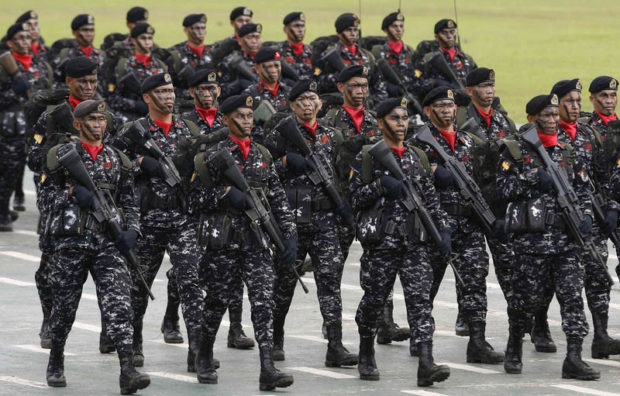
Filipino Scout Rangers take part in a passing parade. (INQUIRER FILE PHOTO)
MANILA, Philippines — Finance Secretary Ralph Recto said on Wednesday he would adopt the Senate’s position on the proposed military and uniformed personnel (MUP) pension reform that would require mandatory contributions only from new entrants to the service.
That is in stark contrast to former Finance Secretary Benjamin Diokno’s proposed blanket contribution that would cover both active personnel and new entrants, a proposal that was opposed by the military and police.
“My personal stance is the same as the position now in the Senate,” Recto told a press conference.
“The government has a social contract with our MUP. And based on that, we promised them a certain pension. So I think the government should respect that,” he added.
Under the Senate’s version of the bill, only new entrants in the country’s military and uniformed services will have pension deductions in their monthly pay. The measure also seeks the creation of a trust fund for MUP that will be managed by the Government Service Insurance System (GSIS).
‘Justifiable’ proposal
According to Recto, the government could also “use” idle assets of the military to help shoulder the costs of MUP pensions.
“So, you hit two birds with one stone there. For example, you’re able to use those assets to pay the pension at the same time. They’re idle. We can create more value in these assets,” he explained.
Chester Cabalza, founding president of Manila-based International Development and Security Cooperation, said Recto’s position on the MUP pension reform “sounds admissible and justifiable.”
“Active uniformed personnel and officers are rendering productive services for our country and the government must recognize that with utmost respect. They should not carry more cudgel by including them in the pension reforms,” Cabalza said.
“With the aggressive recruitment for uniformed personnel in the defense and security sector, these millennial and zillennial entrants have vigor and capacity to pay for pensions as substantiated by the government’s new pension system for uniformed personnel,” he added.
Fiscally unsustainable
Diokno had earlier sounded the alarm over an imminent fiscal collapse stemming from the ballooning pension payments, with total payouts to MUP expected to breach the P1 trillion mark by 2035, from P213 billion last year.
In March last year, he warned that the current pension system was fiscally unsustainable and that the government would push for reforms in Congress to prevent a potential fiscal crisis.
According to Diokno, the average monthly pension of MUPs is almost nine times higher compared to Social Security System retirees and three times higher than GSIS retirees.
Diokno said then that the President recognized the urgency of the matter and had approved in a Cabinet-level meeting the proposed reforms to the MUP pension system.
The government’s proposal was that the reform would apply to all active personnel and new entrants; the automatic indexation of pension to the salary of active personnel of the same rank would be removed; MUP would receive their pension starting at 57 years old, and mandatory contributions would be required for active personnel and new entrants similar to GSIS pensioners.
Present system
The current MUP pension system covers retirees from the Armed Forces of the Philippines, Bureau of Corrections, Bureau of Jail Management and Penology, Bureau of Fire Protection, Philippine National Police, Philippine Public Safety College and Philippine Coast Guard.
It is fully funded by the national government through the annual budget and is automatically indexed to the current salary of the active personnel of the same rank. As such, when the salary of the armed services doubled in 2018, this also reflected in the pension of retired personnel.
At the same time, MUPs are eligible to receive pensions after 20 years of service without a minimum pensionable age requirement and retiring personnel are also automatically promoted one rank higher upon retirement, which means that the pension they will receive will be equivalent to the salary of the next level.
Threat of mass retirement
A bill earlier approved by a House of Representatives committee mandated that new entrants and those in active service would contribute to the pension fund.
MUP in active service would be asked to give 5 percent of their pay for the first three years, 7 percent for the succeeding three years, and 9 percent thereafter, while new entrants would contribute 9 percent of their base and longevity pay.
The government, meanwhile, would contribute 16 percent for the pension of those in active service during the first three years, 14 percent during the fourth to sixth year, and 12 percent for the following years. The government would contribute 12 percent for new entrants.
Last December, however, the Senate Committee on National Defense and Security included an amendment in the proposed measure requiring only new entrants to contribute to the pension fund.
This was to address the grumbling among officials in the armed forces who threatened to retire so as to receive full pension benefits under the current system.